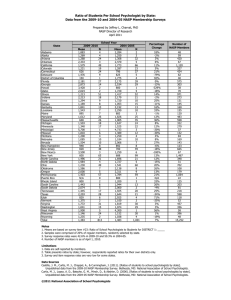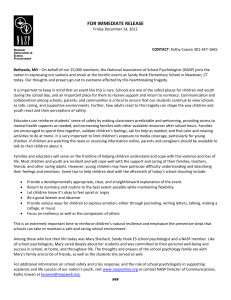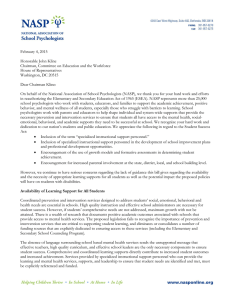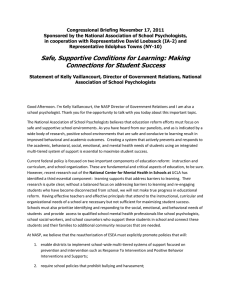NASP 2017 ANNUAL CONVENTION ONLINE CALL FOR PRESENTATION PROPOSALS SUBMISSION
advertisement
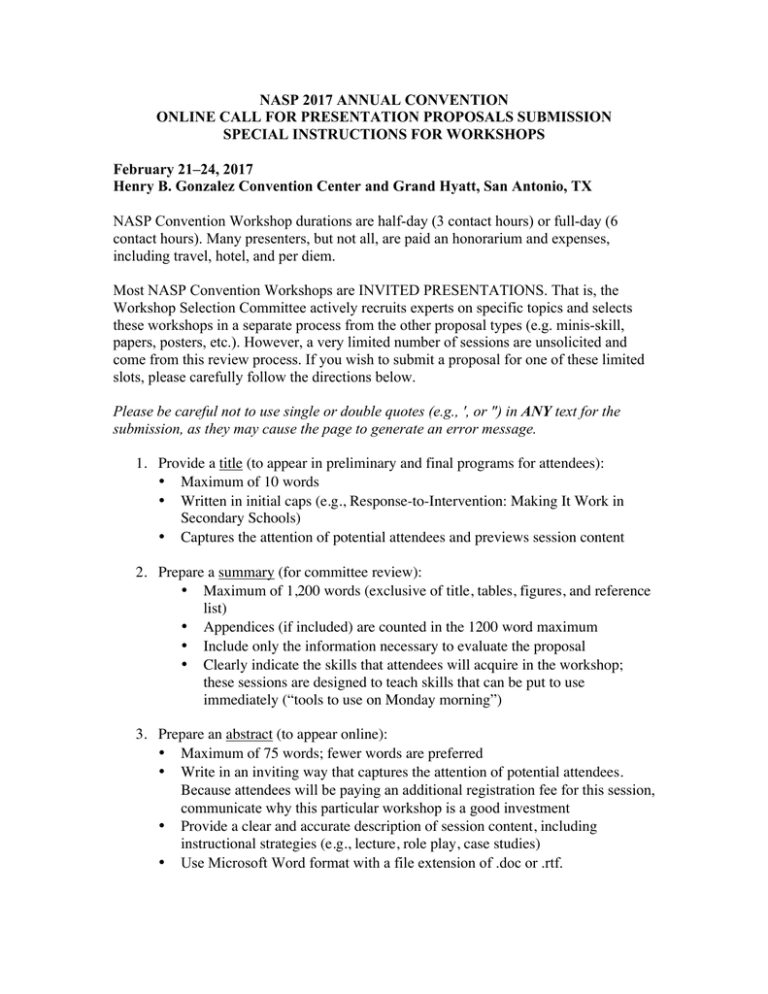
NASP 2017 ANNUAL CONVENTION ONLINE CALL FOR PRESENTATION PROPOSALS SUBMISSION SPECIAL INSTRUCTIONS FOR WORKSHOPS February 21–24, 2017 Henry B. Gonzalez Convention Center and Grand Hyatt, San Antonio, TX NASP Convention Workshop durations are half-day (3 contact hours) or full-day (6 contact hours). Many presenters, but not all, are paid an honorarium and expenses, including travel, hotel, and per diem. Most NASP Convention Workshops are INVITED PRESENTATIONS. That is, the Workshop Selection Committee actively recruits experts on specific topics and selects these workshops in a separate process from the other proposal types (e.g. minis-skill, papers, posters, etc.). However, a very limited number of sessions are unsolicited and come from this review process. If you wish to submit a proposal for one of these limited slots, please carefully follow the directions below. Please be careful not to use single or double quotes (e.g., ', or ") in ANY text for the submission, as they may cause the page to generate an error message. 1. Provide a title (to appear in preliminary and final programs for attendees): • Maximum of 10 words • Written in initial caps (e.g., Response-to-Intervention: Making It Work in Secondary Schools) • Captures the attention of potential attendees and previews session content 2. Prepare a summary (for committee review): • Maximum of 1,200 words (exclusive of title, tables, figures, and reference list) • Appendices (if included) are counted in the 1200 word maximum • Include only the information necessary to evaluate the proposal • Clearly indicate the skills that attendees will acquire in the workshop; these sessions are designed to teach skills that can be put to use immediately (“tools to use on Monday morning”) 3. Prepare an abstract (to appear online): • Maximum of 75 words; fewer words are preferred • Write in an inviting way that captures the attention of potential attendees. Because attendees will be paying an additional registration fee for this session, communicate why this particular workshop is a good investment • Provide a clear and accurate description of session content, including instructional strategies (e.g., lecture, role play, case studies) • Use Microsoft Word format with a file extension of .doc or .rtf. 4. Prepare an abbreviated session description (to appear in the preliminary program): • Maximum of 30 words • Write in an inviting way that captures the attention of potential attendees. Because attendees will be paying an additional registration fee for this session, communicate why this particular workshop is a good investment • Provide a clear and accurate description of session content, including instructional strategies (e.g., lecture, role play, case studies) • Use Microsoft Word format with a file extension of .doc or .rtf. 5. Provide a minimum of three learner objectives *Please try to include one learner objective connecting Diversity/ Multicultural Competence to your topic (to be submitted in the fields provided) using the Guidelines for Writing Learner Objectives for Continuing Professional Development (CPD) Activities. 6. Provide biographical information on each presenter. • Maximum of 50 words each • Outline each presenter’s expertise on the session content • Gather each presenter’s complete CV for uploading (for committee review) 7. Select the Domain of Practice that is most representative of the session content. NASP MODEL FOR COMPREHENSIVE AND INTEGRATED SCHOOL PSYCHOLOGICAL SERVICES—10 DOMAINS OF PRACTICE Practices That Permeate All Aspects of Service Delivery Domain 1: Data-Based Decision Making and Accountability School psychologists have knowledge of varied models and methods of assessment and data collection for identifying strengths and needs, developing effective services and programs, and measuring progress and outcomes. Domain 2: Consultation and Collaboration School psychologists have knowledge of varied models and strategies of consultation, collaboration, and communication applicable to individuals, families, groups, and systems and methods to promote effective implementation of services. Direct and Indirect Services for Children, Families, and Schools Student-Level Services Domain 3: Interventions and Instructional Support to Develop Academic Skills School psychologists have knowledge of biological, cultural, and social influences on academic skills; human learning, cognitive, and developmental processes; and evidence-based curricula and instructional strategies. Domain 4: Interventions and Mental Health Services to Develop Social and Life Skills School psychologists have knowledge of biological, cultural, developmental, and social influences on behavior and mental health, behavioral and emotional impacts on learning and life skills, and evidence-based strategies to promote social–emotional functioning and mental health. Systems-Level Services Domain 5: School-Wide Practices to Promote Learning School psychologists have knowledge of school and systems structure, organization, and theory; general and special education; technology resources; and evidence-based school practices that promote learning and mental health. Domain 6: Preventive and Responsive Services School psychologists have knowledge of principles and research related to resilience and risk factors in learning and mental health, services in schools and communities to support multi- tiered prevention, and evidence-based strategies for effective crisis response. Domain 7: Family–School Collaboration Services School psychologists have knowledge of principles and research related to family systems, strengths, needs, and culture; evidence-based strategies to support family influences on children’s learning and mental health; and strategies to develop collaboration between families and schools. Foundations of School Psychological Service Delivery Domain 8: Diversity in Development and Learning School psychologists have knowledge of individual differences, abilities, disabilities, and other diverse student characteristics; principles and research related to diversity factors for children, families, and schools, including factors related to culture, context, and individual and role difference; and evidence-based strategies to enhance services and address potential influences related to diversity. Domain 9: Research and Program Evaluation School psychologists have knowledge of research design, statistics, measurement, varied data collection and analysis techniques, and program evaluation sufficient for understanding research and interpreting data in applied settings. Domain 10: Legal, Ethical, and Professional Practice School psychologists have knowledge of the history and foundations of school psychology; multiple service models and methods; ethical, legal, and professional standards; and other factors related to professional identity and effective practice as school psychologists. Additional Information: • • • • • Please be prepared to enter the Employer/Affiliation/University/City/State, for any secondary presenter(s) as well as the NASP membership number(s) for any secondary presenter(s) who are NASP members. The accuracy of this information is very important, as it will be used in the convention final program and to determine the membership status/registration fee for your secondary presenter(s). If your name or that of one of the secondary presenter’s changes after the submission of your workshop proposal, be very sure to notify the NASP Convention Department of the name change on the submission. Internet access is not provided by NASP in workshop presentation rooms, due to the extremely high costs of this service. Add the email address convention@naspweb.org to your address book or Safe Sender list, so that you will receive email communications from the NASP Meetings and Conventions Department. If your workshop proposal is accepted, NASP will withdraw any proposal(s) you have submitted for other session types, such as mini-skills, symposia, etc., that duplicate the content that is to be presented during your workshop. QUESTIONS ABOUT NASP CONVENTION WORKSHOPS? Please direct inquiries to Mark E. Swerdlik at meswerd@ilstu.edu CFP Submission
